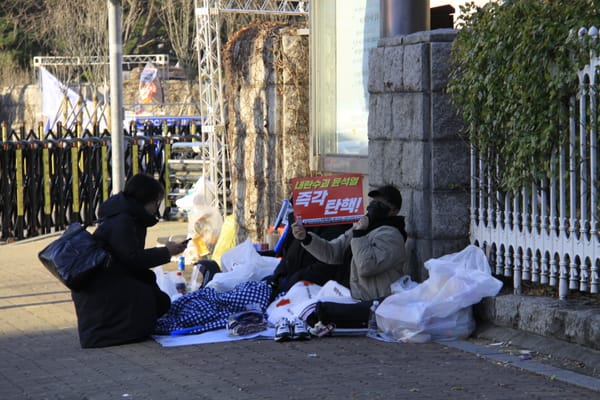Asia Undercovered Round-up: 5 February 2025
This week in Asia Undercovered: human-elephant conflict in Sri Lanka and Nepal, worst air quality across Asia, rising concerns on militarization in Indonesia, 2025 climate budget of India and Indonesia, and torture trial in Kazakhstan.
Sri Lanka’s human-elephant conflict and Nepali villages’ solution
Supun Lahiru Prakash, an environmental activist and freelance journalist from Sri Lanka wrote an opinion piece to criticize the government's unscientific and ad-hoc measure and call for an action to deal with the human-elephant conflict.
Since the former President Gotabaya Rajapaksa’s term, the Sri Lankan government is currently conducting a successive elephant drive mission from their original habitats.
Supun emphasized that the government should appoint a Presidential Task Force and spearhead efforts to mitigate the human-elephant conflict by conserving and protecting elephants within their home ranges as mentioned in the National Action Plan.
Research showed that when female elephants and their calves are relocated from their habitats, lone male elephants follow after, but return back to the original habitats once the drive mission is over. And this return migration causes human-elephant conflict as their original habitats became human settlements.
Meanwhile, Mongabay introduced a model of human-elephant coexistence from a south-eastern Nepali village Bahundangi.
For years, Bahundangi, a village along Nepal’s eastern border with India along the Mechi River. Wild Asian elephants, following their ancient migratory routes, frequently storm farms, devour crops and even ransack granaries. But government policies, conservation efforts and shifting community attitudes have significantly reduced fatalities, with no deaths reported in the area since 2015.
In 2009, Nepal’s government introduced the Wildlife Damage Relief Guidelines, a policy that compensated villagers for losses caused by wildlife. The guideline was revised and updated several times following complaints of being lengthy and not providing adequate compensation to the victims.
Shankar Chettri Luitel, a Nepali conservationist, stepped in. Luitel ensured that compensation was accessible to everyone, including illiterate farmers. He created simplified claim templates, making it easier for victims to navigate the process. Luitel also helped researchers to develop strategies to reduce risk and diversify the income of farmers by planting cash crops such as bay leaf and tea that the elephants did not raid.
The community has also mobilized volunteers into a rapid response team to guide elephants away from residential areas and ensure safe passage through migratory corridors.
Worst air quality: South Asia, Cambodia, South Korea
Nepal’s English weekly Nepali Times ran a story about air pollution in South Asia which caused cancellation of the regional Cricket championship. According to the story, the air quality index or AQI in south-central town in Pakistani Punjab Multan in November 2024, was over 2,000, the Pakistan capital Lahore 1,000, and the Indian capital Delhi 500 AQI. The average concentration of fine suspended particulate matter (PM2.5) is 11 times higher than the World Health Organization’s acceptable limit.
A July 2024 study in the journal Lancet revealed that 11.5 percent of deaths in Delhi are linked to air pollution. A study by the Indian Council for Medical Research said there were 1.7 million deaths in India in 2019 due to dirty air. Pakistanis are on average living 3.9 years less because of poor air quality. In Lahore, they lose seven years of life.
Mandira Nayar, the author of the story called for India and Pakistani governments’ cooperation to save lives of Kathmandu, Lahore, Delhi, and Dhaka residents, who are under a perpetual smog, the fifth season of the region due to brown clouds across northern India and Pakistan during winter.
In Cambodia, as PM2.5 levels soar to hazardous levels, capital Phnom Penh's air quality has hit "very unhealthy", raising alarms about health risks. Local media Kiripost reported that despite growing public concern, authorities have yet to issue clear guidelines on how to address the ongoing issue of pollution.
On January 23, 2025, Phnom Penh’s air quality reached concerning levels, with the AQI soaring to 213. The Ministry of Water Resources and Meteorology announced on January 22 that from January 23 to 31, Cambodia will experience a fog phenomenon.
Sao Phal Niseiy, the editor-in-chief of Cambodianess, wrote an opinion piece to pressure government, specifically the Ministry of Environment to be more active in acknowledging the abnormal air pollution by giving examples of neighboring Thai authorities’ timely action to ensure public health and safety, including the mandatory closure of 352 schools in response to worsening air quality.
Disapeearth, the newly launched Korean-language service independent media startup specializing in climate and ecology investigated and found out the ineffectiveness and varying results of particulate matter(PM) measurement depending on locations.
A story titled "The Gap in Breath: Children Amid Fine Dust" examines the accuracy of fine dust (PM2.5) measurements in relation to their proximity to elementary schools in South Korea.
The story highlighted that while there are 661 air quality monitoring stations nationwide as of September 2024, not all areas receive precise data due to the distance between these stations and specific locations. Experts suggest that the effective range of a monitoring station is within a 4-kilometer radius. Approximately 29.7 percent of elementary schools of South Korea (1,878 out of 6,316) are situated outside this effective range, placing them in a "blind spot" for accurate fine dust information.
Militarization in Indonesia
Made Supriatma, an Indonesian senior journalist and scholar from Bali wrote an article arguing the Indonesian Army's (TNI-AD) recent initiatives that may signal a return to the controversial "dual function" (dwifungsi) doctrine. The dual function of the Indonesian army historically allowed the military to exert influence over both defense and civilian sectors. The author featured following developments:
- Establishment of New Regional Military Commands (Kodam): The TNI-AD plans to increase the number of Kodams from the current 15 to 37, aiming for nearly every province to have its own command. By 2025, five new Kodams are expected to be operational.
- Formation of Territorial Development Battalions: The Army intends to create 100 Territorial Development Battalions by 2025, deploying them across various districts. These units will possess combat capabilities and specialize in areas like agriculture, livestock, fisheries, and health services to support local development.
- Deployment in Strategic Regions: A significant focus is on South Papua, where 2.6 million hectares are designated for food estates central to President Prabowo Subianto's policies on food and energy security. Three combat battalions, totaling 2,100 personnel, have already been deployed to Merauke, South Papua, with additional units planned for other parts of the Papua region.
- Concerns Over Military Influence in Civilian Affairs: While the official rationale emphasizes enhanced national defense and territorial management, critics are concerned that these expansions may lead to increased military involvement in civilian matters, reminiscent of the dwifungsi era.
2025 climate budget: India and Indonesia
Indian Finance Minister Nirmala Sitharaman presented the budget for the financial year 2025-26 in parliament on February 1. The budget does emphasize the Union government’s plans of mitigating climate change through clean energy transition.
India’s science and environment fortnightly ‘Down to Earth’ raises a question in this short YouTube clip whether it does an adequate job of equipping the country to adapt to the adverse impacts of climate change.
Indonesian-language daily newspaper Kompas reported that Indonesia needs an additional 180 trillion Indonesian Rupiah per year to handle climate change. Based on calculations from 2016 to 2030, Indonesia needs an average total funding of 266.3 trillion per year for the climate budget. While the average allocation in the state budget of the last three years reached 80.3 trillion Indonesian Rupiah per year.
Torture Trial in Kazakhstan
The Diplomat reported that the torture trial in Kazakhstan ends in prison sentences to some of the perpetrators but dissatisfaction lingers. In a recent verdict, a court in Kaskelen, Kazakhstan, sentenced six police officers to three-year prison terms for abuse of power and the torture of 44 foreign nationals during the January 2022 unrest, known locally as Qandy Qantar.
Among the victims was Kyrgyz jazz musician Vicram Rouzakhunov, whose televised coerced confession drew international condemnation. The officers were found guilty of detaining and torturing citizens from Kyrgyzstan, Uzbekistan, and Tajikistan at a facility near Almaty.
Despite the convictions, dissatisfaction persists among victims and human rights advocates. Rouzakhunov described the trial as "only a small step towards justice," emphasizing the ongoing struggle for human rights in Kazakhstan. Aina Shormanbanbaeva, president of the International Legal Initiative Public Foundation, highlighted that only a fraction of the torture victims were officially recognized, and many were unable to participate in the investigation due to deportation and entry bans.
I would like to conclude this story with Kyrgyz jazz musician Vicram Rouzakhunov’s piece titled “Sweet November in Bishkek”.
Asia Undercovered: Round-ups and in-depth analysis of the news, events, trends and people changing Asia, but not getting enough attention in the US media. Curated by journalist Seulki Lee.



